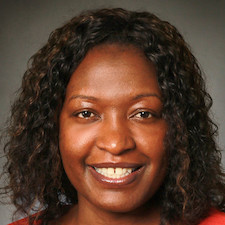 Esther Obonyo, an associate professor in the College of Engineering at Pennsylvania State University, has been named director of the Global Building Network. The network is a joint initiative of Penn State and the United Nations Economic Commission for Europe, which aims to advance building science, construction processes and building management in order to create an international framework that will make buildings more sustainable, more efficient and healthier for people.
Esther Obonyo, an associate professor in the College of Engineering at Pennsylvania State University, has been named director of the Global Building Network. The network is a joint initiative of Penn State and the United Nations Economic Commission for Europe, which aims to advance building science, construction processes and building management in order to create an international framework that will make buildings more sustainable, more efficient and healthier for people.
Dr. Obonyo holds a bachelor’s degree in building economics from the University of Nairobi in Kenya, a master’s degree in architecture from the University of Nottingham in England, and a doctor of engineering degree from Loughborough University in England.
 Larry Walker was appointed an assistant professor of educational leadership at the University of Central Florida. He was a lecturer at Loyola University in Maryland. He also taught at Howard University in Washington, D.C..
Larry Walker was appointed an assistant professor of educational leadership at the University of Central Florida. He was a lecturer at Loyola University in Maryland. He also taught at Howard University in Washington, D.C..
Dr. Walker served as the legislative director for former Congressman Major R. Owens. He holds an educational doctorate from Morgan State University.
 Ayodeji Ogunnaike is a new assistant professor of Africana studies at Bowdoin College in Brunswick, Maine. His research focuses on traditional Yoruba religion in West Africa and diaspora.
Ayodeji Ogunnaike is a new assistant professor of Africana studies at Bowdoin College in Brunswick, Maine. His research focuses on traditional Yoruba religion in West Africa and diaspora.
Dr. Ogunnaike holds bachelor’s, master’s, and doctoral degrees, all from Harvard University.

Dr. Barnes is a graduate of Spelman College in Atlanta, where she majored in political science. She holds master’s degrees from Georgia State University and Emory University and a Ph.D. in cultural anthropology from Emory University.

Dr. Moffett holds a bachelor’s degree and an educational doctorate from Clark Atlanta University. He earned a master’s degree at Fayetteville State University.

Dr. Hall earned a bachelor’s degree and a master of social work degree at New Mexico State University. She holds a Ph.D. in social work practice from Smith College in Northampton, Massachusetts.

